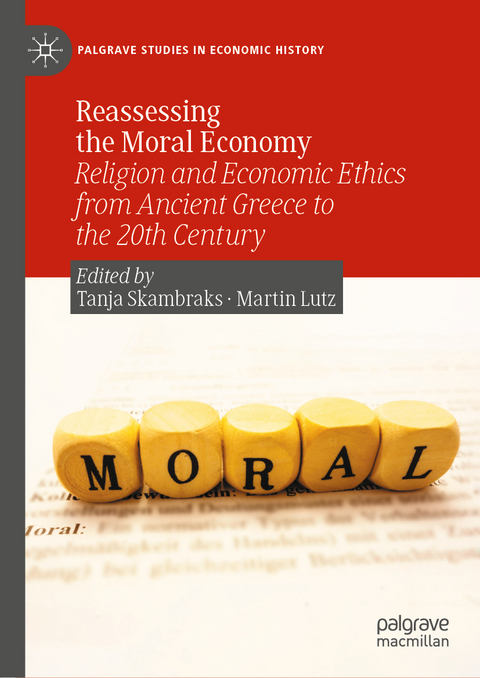
Reassessing the Moral Economy
Springer International Publishing (Verlag)
978-3-031-29833-2 (ISBN)
This book examines the concept of moral economy originally established by E.P. Thompson, focusing on the impact of religious norms on economic practice. With each chapter discussing a different empirical case study, the interrelations of the economy and religion are explored from antiquity through to the 20th century. The long-term trajectory and comparative perspective allows for moral economy to be seen in relation to ancient Greek commerce, medieval pawn-broking, Christian and Jewish economic ethics, urban social politics during the Plague, the Jesuit mission in Paraguay, the Ottoman Empire, religion in modern American capitalism, and Catholic attitudes toward taxation.
This book aims to provide insight into how moral thinking about the economy and economic practicehas evolved from a long historic perspective. It will be relevant to students and researchers interested in economic history and cultural economics.
lt;p>Tanja Skambraks is Assistant Professor at the University of Mannheim .
Martin Lutz is Assistant Professor at the Humboldt University of Berlin.
Introduction (Martin Lutz and Tanja Skambraks).- Part 1: Antiquity and Middle Ages.- Chapter 1.The Popular Morality of Ancient Greek Commerce (Moritz Hinsch).- Chapter 2. Early medieval property transfers in favour of the church between religion and economy (Franziska Quaas) .- Chapter 3. Between Pietas and Usury. Dynamics of a Moral Economy in the Middle Ages (Tanja Skambraks).- Chapter 4. Past the Limits of Usury: Jews and the Moral Economy of Moneylending in the Late Medieval German Territories (Aviya Doron).- Part 2: Early Modern Period.- Chapter 5.The Moral Economy of Epidemics. Emergency, Charity and Poor Relief in Early Modern Italian Plague Regulations (Lorenzo Coccoli).- Chapter 6. Fiscality, Debt, and Moral Economy: The View from Florentine Civic Chronicles (Giorgio Lizzul).- Chapter 7. Moral Economists. The Jesuit Mission in Paraguay and the Idea of Economic Growth in Early Modern Times (David Bete & Philip Knäble, Georg-August-Universität Göttingen).- Chapter 8. Profit due to Christian behaviour. The Moral Economy of the Moravian Church in the 18th Century (Thomas Dorfner).- Part 3: Modern Period.-Chapter 9. Negotiating Religion, Moral Economy and Economic Ideas in the Late Ottoman Empire: Perspectives of Peasants and the Intelligentsia (E. Attila Aytekin).- Chapter 10. Leading a "simple" life in modern capitalism. The moral economy of Mennonite consumption in mid-20th century America (Martin Lutz).- Chapter 11. Tax Morale in a Centralised Church: How Catholic Clergies Adapted Norms of Paying Taxes to Secular Institutions (1940s-1950s) (Korinna Schönhärl).- Chapter 12."Resort City? Why what happened to Las Vegas, Sin City?": Suburban America, Religious Groups, and the Moral Economy of Gambling in Las Vegas, 1945-1969 (Paul Franke).- Chapter 13.Reassessing Moral Economies. Concluding thoughts (Benjamin Möckel).
| Erscheinungsdatum | 19.08.2023 |
|---|---|
| Reihe/Serie | Palgrave Studies in Economic History |
| Zusatzinfo | XIII, 298 p. 4 illus., 3 illus. in color. |
| Verlagsort | Cham |
| Sprache | englisch |
| Maße | 148 x 210 mm |
| Gewicht | 503 g |
| Themenwelt | Geschichte ► Teilgebiete der Geschichte ► Kulturgeschichte |
| Wirtschaft ► Allgemeines / Lexika | |
| Wirtschaft ► Volkswirtschaftslehre | |
| Schlagworte | Charitable banking and ethics • Early medieval property transfers • Economics and religion • Economic Sociology • Ethics of Exchange • Morality of Ancient Greek Commerce • The Idea of Economic Growth |
| ISBN-10 | 3-031-29833-0 / 3031298330 |
| ISBN-13 | 978-3-031-29833-2 / 9783031298332 |
| Zustand | Neuware |
| Informationen gemäß Produktsicherheitsverordnung (GPSR) | |
| Haben Sie eine Frage zum Produkt? |
aus dem Bereich


